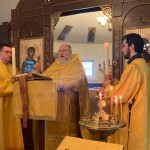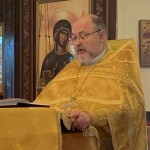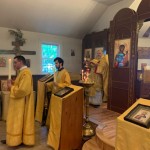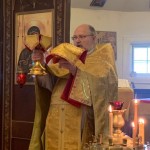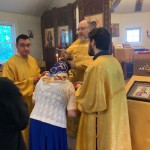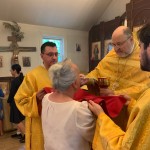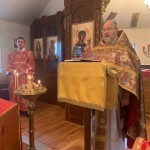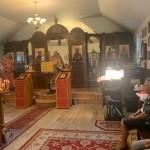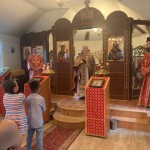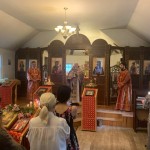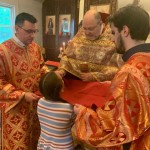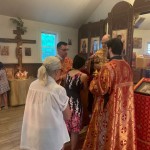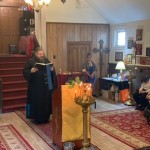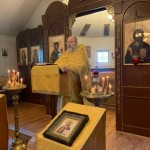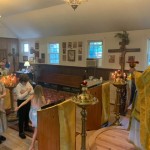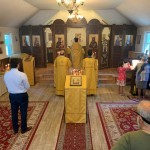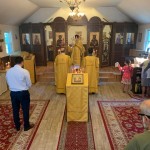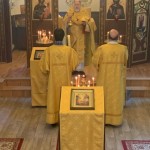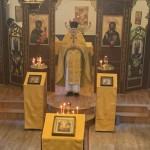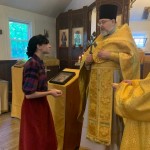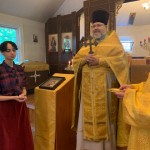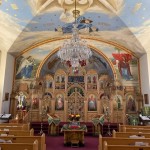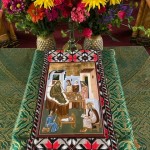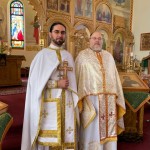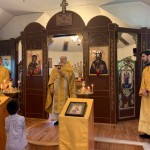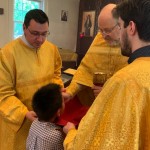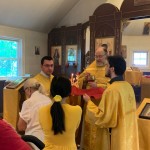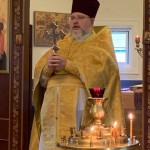On July 24, on the 6th Sunday after Pentecost, feast of the Holy Equal to the Apostles Princess Olga, the Rector of St. George Church, Archpriest Igor Tarasov served the Divine Liturgy in our temple. After the Gospel lesson he preached the following homily:
“Dear brothers and sisters in Christ! Today we celebrate the 6th Sunday after Pentecost and feast of the Holy Equal to the Apostles Princess Olga. Today’s Gospel reading is a continuation of the story about our Lord Jesus Christ told last Sunday. A week ago we heard that Jesus was asked by the people of the country of Gargesines to leave their region. Thus “He got into a boat, crossed over and came to His own city” (Mt. 9, 1). This was the city of Capernaum which served as our Lord’s headquarters. Now we hear of another miracle Jesus performed: healing of the paralytic. The Gospel lesson of today tells us about the divine power of our Lord Jesus Christ. It shows us three signs of such a power Christ had as the Son of God”.
“First power is that He knew the secrets of hearts. Hearing that Jesus grants the paralyzed man forgiveness of sins, the scribes who were present there start thinking that Jesus is blaspheming. But Jesus reads their minds and argues with them openly. Only God can fully know the secrets of our hearts, only God can read our minds. Second power is that Jesus could grant the forgiveness of sins. No one but God can forgive sins. The scribes were correct in that. But they had no faith that Jesus is God. Thus He has a power to forgive sins. Here we see the third sign of the divine power of Christ – that He can heal the disease merely by His word”.
“Today’s Gospel lesson may also teach us about our reception of the divine power coming from our Lord Jesus Christ. We ought to be His Church, a gathering of people which constantly practices the reception and acquiring of that power. And in order to be the Church we need faith”.
“Recently we celebrated feast of the Holy Apostles Peter and Paul. And we read the Gospel which was also about faith necessary for acquiring the divine power from Christ. When Jesus asked His Disciples what they would say about Him, St. Peter expressed their faith and confessed, “You are the Christ, the Son of the living God” (Mt. 16, 16). That kind of faith of the Apostles made them able to receive the Holy Spirit and to become the Church. And that very faith allowed the Apostles to receive from Christ the power to bind and loose the sins of men. The Lord is telling Peter, “And I will give you the keys of the Kingdom of Heaven, and whatever you bind on earth will be bound in heaven, and whatever you loose on earth will be loosed in heaven” (Mt. 16, 19). If in today’s Gospel lesson the people are amazed that Jesus forgives the sins of the paralytic, then according to another passage in the same Gospel of Matthew, a similar power is possessed not only by Christ, but also by His Church, personally by the Apostles. And that power the Apostles transmitted to their successors, the Bishops. And by today Christ continues to forgive our sins, but through His Church, through the power He gave to her because of the faith of His Disciples”.
“Celebrating today the memory of the Holy Princess Olga, we call her Equal to the Apostles. This is because she was introducing Christian faith to her country. But this is also because she had faith equal to the faith of the Holy Apostles, the same faith that St. Peter had when he confessed that Jesus is the Christ, the Son of the living God. That faith was able to receive divine grace and the power of Christ to plant the seed of Christianity in the land of the ancient Rus’. If we recall the icon of St. Peter and Paul that we had in the middle of the church on their feast, we should remember that both of them are pictured holding a model of the church. And today the icon of St. Olga we have is similar: Olga is shown holding a little church in her hand. In this way we are taught that she was Equal to the Apostles, had the Apostolic faith and wished to establish the local Church in her land”.
“But Olga was not able to make Rus’ Christian because she did not have enough support from the people. Her faith was more personal than collective. It could not grow to the level of the faith of the local Church. But St. Olga began to saw that seed of Christian faith. First of all, she was able to teach that faith to her grandson Vladimir who later fully embraced it and baptized his people, established the local Church of Rus’”.
“Therefore, dear brothers and sisters, in order to receive the gift of the life-giving, healing and forgiving power of Christ, we need faith. We need such a faith that Jesus saw in St. Peter and in all His Apostles. Faith that we may see in St. Olga, Equal to the Apostles. Similar faith was seen in those people, the paralytic’s friends who brought him to Jesus. Their collective faith became a reason for Christ to perform the miracle of healing. And collective faith of the Apostles became a reason of granting them the power to bind and loose the sins of men. The same faith makes us the Church of Christ. And then not only on St. Peter but on all other Christians believing in Christ, the Son of the living God, the Lord founds and builds His Church. He founds it on a rock of faith. And we are called to be such a rock”.
“May our faith save us! The faith of Christ, the faith of the Apostles and the faith of the Holy Equal to the Apostles Olga. May that holy faith save us!”
During the Litany of Fervent Supplication the Rector had a petition for the suffering country of Ukraine and its people. He also added a commemoration of the “suffering Ukrainian land” at the Great Entrance.
Before the Holy Communion the choir prayerfully performed hymns dedicated to St. Olga.
After the dismissal of the Liturgy the Rector congratulated our Warden and Choir Director, Olga Roussanow and our parishioner Olga Knyazeva on the occasion of their name day handing them the Theotokian prosphora. Traditional Polychronion (“Mnogaia leta!”) was proclaimed.
The Rector had a brief speech in Russian. He commended Olga Russanow on her great work for the Church stating that due to her active participation in the parish life our community is functioning and doing well. However, we need more active participation on the part of other members.
Following the Liturgy the Rector and parishioners had a luncheon at the nearby Veranda restaurant to celebrate the name day of our two Olgas. The greetings and toasts were raised in honor of them and final Polychronion sung at the conclusion of the meal.

